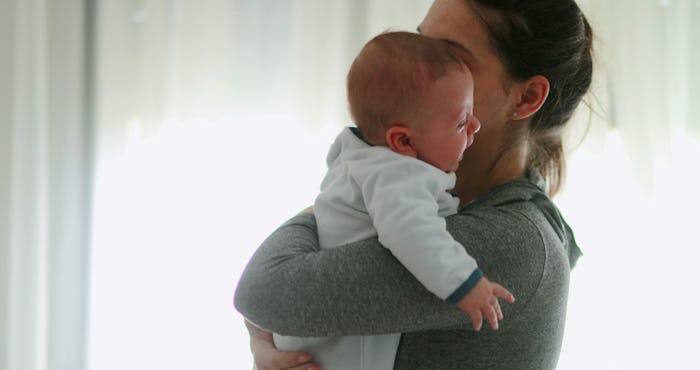Life

Postpartum Depression Can Last Years If Left Untreated, Mental Health Experts Say
Whether you can’t get an appointment quickly or you can’t find affordable care, mental health visits are hard to access for many Americans. New moms not feeling like themselves may want to know, how long does postpartum depression last if untreated? It can be hard to trudge through those obstacles when you’re depressed, so it's important to know if PPD something that will pass with time.
Postpartum depression (PPD) is a mood disorder that disrupts new moms’ mental health after childbirth. The Cleveland Clinic states that 50 to 75 percent of new mothers experience the baby blues after delivery, and around 15 percent of these women will develop PPD. Unfortunately, PPD doesn’t just go away after a couple of weeks.
Brittney Pohler, PA-C, MPH, at Baylor Scott & White Medical Center – College Station, told Romper in an interview that while the PPD diagnosis cuts off at 12 months, that doesn’t mean the disorder does.
“Postpartum depression typically starts within the first couple of weeks following delivery. It can last, if untreated, from weeks to years. After the first year, we don’t call it PPD, but the biggest risk is PPD lingering on and becoming a chronic depression,” she says.
“We consider postpartum depression existing through 12 months postpartum, and we know it often doesn’t resolve without some kind of intervention,” Keri Hanson, licensed clinical social worker and program coordinator for SCL Health's Maternal Mental Health program, says in an interview with Romper. “We also know that of the number of women identified as having PPD, only about 50 percent of them actually receive treatment, and a very small percentage of that number receive adequate treatment.”
Symptoms of PPD aren’t just thoughts of harm to yourself or your baby, as seen on TV. The National Institute of Mental Health’s list includes feeling sad, hopeless, or empty, crying more often than usual, irritability, anger, trouble concentrating and making decisions, eating too little or too much, and having frequent headaches or unexplained muscle pain. So, why would PPD ever not be treated? For many women, finding care isn’t as easy as picking up the phone.
“There are a ton of barriers to care,” says Hanson. “It’s difficult to find a therapist who has experience with perinatal emotional health, and the barrier of just finding a therapist who happens to be contracted with your specific insurance provider. And one of the largest barriers, in my opinion, is the barrier between mental and physical health. Patients are having to access to two care systems for their needs.”
Despite the difficulty in finding care, it’s worth the effort, says Hanson. There are a number of risks of leaving PPD untreated, and it’s unlikely to go away on its own.
“Untreated PPD places partners at risk for depression, and increases the risk of partnership dissolution. And, there are social and financial tolls as well," Hanson continues. "Untreated PPD, when a mom transitions back to work, it’s definitely going to impact work productivity. For a mother, having depression going untreated for a while can damage sense of self. Depression can also take a physical toll, like lack of sleep or nutrition. In terms of risk to the child, there are risks in terms of not developing an adequate attachment. Those two first years of a child’s development are really integral to developing secure attachment.”
Women experiencing PPD symptoms should always tell their doctors. OB-GYNs are trained to help.
“All women should have a routine postpartum checkup with their OB/GYN, and one of our goals is screening you for PPD and talking about your feelings. If they’re feeling like they’re struggling, push to be seen sooner by your provider. If you feel like something’s not right, don’t wait the usual four to six weeks for that appointment to come,” says Pohler. “If you don’t feel comfortable talking to your OB/GYN, try your primary care provider. Even at your infant’s checkups, their pediatrician can screen you, and they may send you our way and we can talk about treatment options.”
Self-care is great for any new mom’s mental wellbeing, but especially for women with PPD. While it may not completely alleviate the symptoms of PPD, experts agree it can’t hurt. And ultimately, taking care of yourself will help you care for your new family.
“Just being able to talk openly with a trusted friend or family member is huge,” says Hanson. “Tune into taking care of yourself, things like nutrition, prioritizing sleep, and finding time your body and mind can be in a completely relaxed state.”
Hanson suggests actually scheduling self-care. She says many women with PPD who are used to working may find adding routine to their days beneficial.
“Oftentimes women have been working most of their adult life, and their daytime hours have been very structured. On maternity leave, it’s often the first time they’ve had that much unstructured time. During the pregnancy, you can create a fourth trimester support plan. Schedule your showers, meals, exercise, and friends coming over.”
If you or someone you know is experiencing suicidal thoughts, call the National Suicide Prevention Hotline at 1-800-273-8255 or text HOME to the Crisis Text Line at 741741. You can also reach out to the Trans Lifeline at 877-565-8860 or the Trevor Lifeline at 1-866-488-7386, or to your local suicide crisis center.
Experts:
Keri Hanson, licensed clinical social worker and the program coordinator for SCL Health's Maternal Mental Health program
Brittney Pohler, PA-C, MPH, at Baylor Scott & White Medical Center – College Station
This article was originally published on